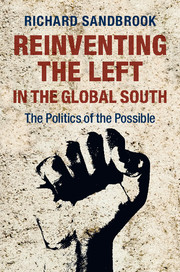Book contents
- Frontmatter
- Epigraph
- Contents
- List of figures
- List of tables
- Acknowledgments
- 1 Reinventing the Left
- 2 Alternative visions: leftist versus neoliberal paradigms
- 3 How neoliberalism fails
- 4 Making history: agency, constraints and realities
- 5 Pitfalls and promise of the moderate Left
- 6 The radical Left: moving beyond the socialist impasse
- 7 Politics of the possible
- Bibliography
- Index
3 - How neoliberalism fails
Published online by Cambridge University Press: 05 September 2014
- Frontmatter
- Epigraph
- Contents
- List of figures
- List of tables
- Acknowledgments
- 1 Reinventing the Left
- 2 Alternative visions: leftist versus neoliberal paradigms
- 3 How neoliberalism fails
- 4 Making history: agency, constraints and realities
- 5 Pitfalls and promise of the moderate Left
- 6 The radical Left: moving beyond the socialist impasse
- 7 Politics of the possible
- Bibliography
- Index
Summary
Free markets, as Karl Polanyi memorably argues in The Great Transformation (2001 [1944]), tend to become tyrannical and destructive masters. The “great transformation” signifies the rise of a market system as the economy not only detaches itself from confining social norms and regulations, but also subordinates social institutions to economic imperatives (efficiency, commodification, profitability) and the instrumental drives of opportunistic actors. However, the liberal movement never actually realizes the ideal of a self-regulating market system owing to the destructiveness of unleashed market forces. A dialectical “double movement” arises in which the movement toward a liberal-market economy creates such damage to society and nature that a counter-movement of societal protection spontaneously arises, according to Polanyi.
Of particular importance is the continuous commodification of labor, land and money – the “fictitious commodities” – that is driven by the logic of profitability. Liberals believe that all markets, including those for labor, land and money, must operate according to the same principle of market-determined prices, if an efficient and productive market economy is to develop. But these three factors of production differ qualitatively from other markets, Polanyi aptly notes (2001 [1944], chaps. 11–18). They are either not produced at all or, if produced, not for sale on the market. To treat labor, land and money as if they were commodities like the others leads to disaster. Labor markets are unique in involving the sale of labor power, which is embodied in human beings. Human beings are ends in themselves; to treat them as disposable commodities subject to the whim of self-interested actors would ultimately undermine social solidarities and subject people to abject insecurity.
- Type
- Chapter
- Information
- Reinventing the Left in the Global SouthThe Politics of the Possible, pp. 63 - 101Publisher: Cambridge University PressPrint publication year: 2014

